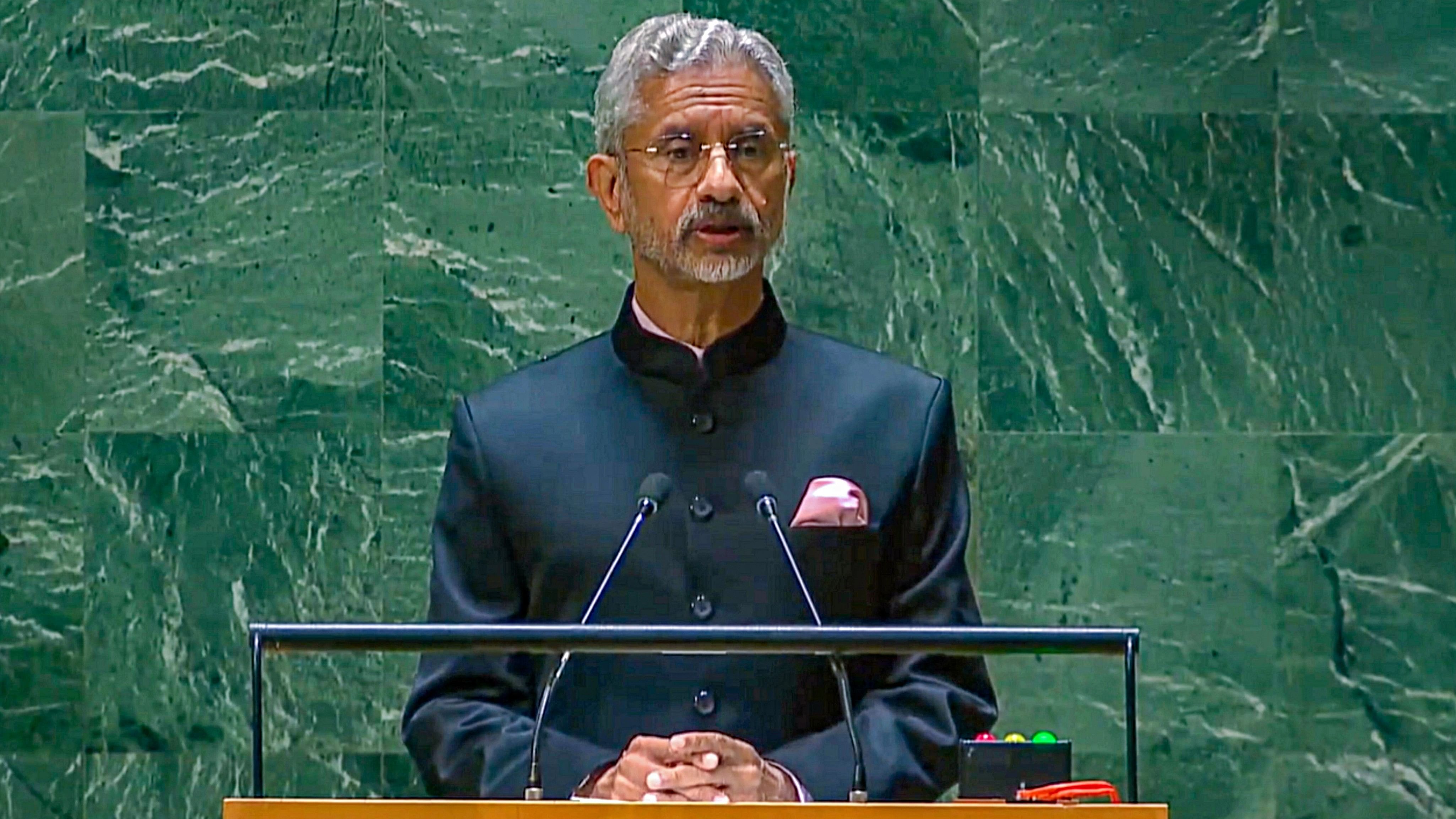
External Affairs Minister S Jaishankar speaks at the General Debate of the 78th session of United Nations General Assembly, in New York, Tuesday, Sept. 26, 2023.
Credit: PTI Photo
India on Tuesday sent a subtle but firm message to Canada from the United Nations headquarters in New York, with External Affairs Minister S Jaishankar telling the international organisation’s General Assembly that no nation should allow its responses to terrorism and extremism to be guided by political convenience.
He said that the admission of the African Union as a member of the G20 at the initiative of India during the recent summit of the bloc in New Delhi “should inspire the United Nations, a much older organization, to also make the Security Council contemporary”. Ahead of his visit to Washington DC to explore the possibility of President Joe Biden attending the Republic Day ceremony in New Delhi on January 26 next year as a chief guest, the external affairs minister also sent out a message to the US-led West, stating: “The international order is diverse, and we must cater for divergences if not differences. The days when a few nations set the agenda and expected others to fall in line are over.”
Jaishankar addressed the United Nations General Assembly (UNGA) amid a raging diplomatic row between New Delhi and Ottawa over Canadian Prime Minister Justin Trudeau’s allegation about India’s role in the June 18 killing of Khalistani Sikh extremist Hardeep Singh Nijjar in the North American country. New Delhi dismissed the allegation as ‘absurd’, ‘motivated’ and ‘unsubstantiated’ and accused Ottawa of being reluctant to act on its repeated requests against the Khalistani Sikh extremists in Canada and stop them from running the secessionist campaign against India.
The world “must not countenance that political convenience determines responses to terrorism, extremism and violence”, the external affairs minister told the UN General Assembly, just days after India called Canada “a safe haven for terrorists” – a term it earlier used only for Pakistan.
New Delhi has been accusing Trudeau’s government in Ottawa of being driven by vote-bank politics that has been stopping it from acting on anti-India Khalistani Sikh extremists in Canada.
Nijjar was accused in a number of cases in India, including the ones involving murder, terrorist activities and sedition. The Interpol had in 2016 issued a Red Corner Notice against him on India’s request for his alleged role in killing six people in a blast at a cinema in Ludhiana in Punjab in 2007.
He, however, lived freely in Canada and even went on to be the president of a gurdwara at Surrey in the British Columbia province of the country. He was murdered near the gurdwara on June 18.
Trudeau’s allegation against New Delhi took India-Canada relations to a breaking point. The two sides over the past few days expelled each other’s diplomats and issued tit-for-tat travel advisories. New Delhi also stopped issuing visas to citizens of Canada and asked Ottawa to downsize its diplomatic and consular missions in India. The negotiation for a trade deal has also been suspended.
“Similarly, respect for territorial integrity and non-interference in internal affairs cannot be exercises in cherry-picking,” he said, apparently targeting not only China but also the US and the others in the West. His comment came with the Indian Army resisting the Chinese People’s Liberation Army’s aggression in the Himalayas, Beijing accusing New Delhi of helping Dalai Lama in running a separatist campaign in Tibet but joining Islamabad to oppose the August 2019 move by Prime Minister Narendra Modi’s government to end the special status of J&K and splitting the state into two union territories. The US has also been expressing concerns over the alleged backsliding of democracy in India.
“We often advocate the promotion of a rules-based order. From time to time, respect for the UN Charter is also invoked,” Jaishankar said in his address to the UN General Assembly. “But for all the talk, it is still a few nations who shape the agenda and seek to define the norms. This cannot go on indefinitely. Nor will it go unchallenged,” he said, tacitly sending a message to the US and the others in the West. He said that a fair, equitable and democratic order would surely emerge when all would put their minds to it. “And, for a start, that means ensuring that rule makers do not subjugate rule takers. After all, rules will work only when they apply equally to all,” he said, with India over the past few months vocally championing the cause of ‘Global South’.
“We must never again allow an injustice like vaccine apartheid to recur. Climate action too cannot continue to witness an evasion of historical responsibilities,” he said, adding: “The power of markets should not be utilized to steer food and energy from the needy to the wealthy.
